Economic Crisis
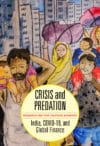
With the advent of COVID-19, India’s rulers imposed the world’s most stringent lockdown on an already depressed economy, dealing a body blow to the majority of India’s billion-plus population. Yet the Indian government’s spending to cushion the lockdown’s economic impact ranked among the world’s lowest in GDP terms, resulting in unprecedented unemployment and hardship. Crisis and Predation shows how this tight-fistedness stems from the fact that global financial interests oppose any sizable expansion of public spending by India, and that Indian rulers readily adhere to their guidance. Meanwhile, under the banner of reviving private investment, India’s rulers have planned giant privatizations, and drastically revised laws concerning industrial labor, the peasantry, and the environment—in favor of large capital. | more…

Since the emergence of COVID-19, the United States has quite openly decided to use the crisis, at a global scale, as a weapon against its perceived rival, China. In this context, India has taken a number of steps to restructure its relation to China, asserting economic stances and implementing policies that are becoming more and more closely entwined with its geopolitical positions and aspirations. | more…
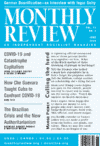
The current massive oil glut is the product of the effects of the tight oil or shale oil revolution, which for a time turned the United States into the biggest oil and gas producer in the world. Now, suddenly as a result of an overproduction of world oil, made far worse by the sudden falloff in demand due to the COVID-19 pandemic, we are witnessing the possible euthanasia of the U.S. tight oil industry, bleeding cash even before the oil price collapse and encumbered with mountains of debt. | more…

Commodity Chains and Ecological-Epidemiological-Economic Crises
Since the late twentieth century, capitalist globalization has increasingly adopted the form of interlinked commodity chains controlled by multinational corporations, connecting various production zones, primarily in the Global South, with the apex of world consumption, finance, and accumulation primarily in the Global North. COVID-19 has accentuated as never before the interlinked ecological, epidemiological, and economic vulnerabilities imposed by capitalism. | more…
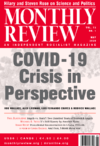
In its wider economic, ecological, epidemiological, and public health context, the current COVID-19 pandemic demonstrates the enormous dangers of the metabolic rift in human ecology and epidemiology brought on by capitalist social relations in the age of monopoly-finance capital, global agribusiness, and intricate, globe-spanning supply chains associated with the extreme exploitation and expropriation of both human beings and nature. Neoliberalism, representing the inner logic of capitalism, has left the world vulnerable to catastrophe wherever it has come into play. | more…
The climate crisis is proving to be antithetical to the neoliberal machines that define current forms of social organization. Reducing fossil fuel consumption, the largest contributor to climate change, requires collaborative efforts. These efforts must take into consideration the foundational role of fossil fuels in modern economies. Yet, renewables lack many of the characteristics that have made fossil fuels so desirable in production processes, limiting their ability to expropriate human labor. At the same time, climate catastrophes, such as wildfires and hurricanes, disrupt the infrastructural momentum of fossil fuel economies, destabilizing the mechanisms of capital accumulation that derive from the production and consumption of these fuels. All of these problems have come to a head in the recent crises in Chile and California. | more…

How can we build a future with better health and homes, respecting people and the environment? The 2020 edition of the Socialist Register, Beyond Market Dystopia, contains a wealth of incisive essays that entice readers to do just that: to wake up to the cynical, implicitly market-driven concept of human society we have come to accept as everyday reality. Intellectuals and activists such as Michelle Chin, Nancy Fraser, Arun Gupta, and Jeremy Brecher connect with and go beyond classical socialist themes, to combine an analysis of how we are living now with visions and plans for new strategic, programmatic, manifesto-oriented alternative ways of living. Crafted with purposeful hope in an age of despair, each essay in this volume aims to create a world of agency and justice. | more…
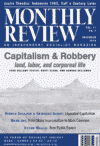
Bloomberg insists that we need to get our priorities straight: the economy comes before the earth, capitalism before nature. Yet, from any sort of realistic, world-wise perspective, it is clear that we are faced with two immense, imminent, and irreversible crises, one threatening within as short a time as a year to destabilize the world capitalist economy, the other promising to destroy the planet as a home to humanity, destabilizing industrial civilization and undermining the survival chances of hundreds of millions or even billions of people this century. Both represent the culmination of capitalist contradictions over centuries of development and both point to the need to transform society in revolutionary ways. It is the coevolution of economic and ecological contradictions under global monopoly-finance capital that defines the epochal historical crisis of our times. In this new issue of Monthly Review, we also celebrate Monthly Review‘s relationship with the annual School of Ecology in Mauritius. | more…
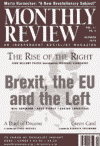
New issue of Monthly Review! If there is one thing that is clear about the economic situation in the mature capitalist economies, as we write these notes in mid-August 2019, it is that the financial world is increasingly running scared and looking for safe havens, worrying about the storm clouds ahead. There is now little doubt that the world economy is on the verge of a recession after a long sluggish recovery from the Great Financial Crisis of 2007-09. In itself this should not give occasion to surprise. In this instance, however, there lurks a bigger fear, the possibility of a financial Armageddon on the level of the Great Financial Crisis of 2008—or worse. | more…

Costas Lapavitsas’s The Left Case Against the EU (Polity, 2019) is recognized as the leading work advocating Lexit, the left-wing case for Brexit, and for nations leaving the European Union more generally. In light of current Conservative British Prime Minister Boris Johnson’s commitment to exit the European Union by October 31, even if it means a no-deal Brexit, the role of the left takes on growing importance. Moreover, this raises issues of the European Union generally, including the dominance of neoliberalism within it and the question of German hegemony. Here, Neil Davidson offers an assessment of Lapavitsas’s book. | more…

In this continuation of the exchange on the European Union, the United Kingdom, and the left, Andy Storey engages with Costas Lapavitsas’s arguments in The Left Case Against the EU. | more…

A Socialist Stance Toward the European Union
As part of the exchange on the European Union, the United Kingdom, and the left, Costas Lapavitsas provides an extensive response to Neil Davidson’s and Andy Storey’s contributions. | more…










